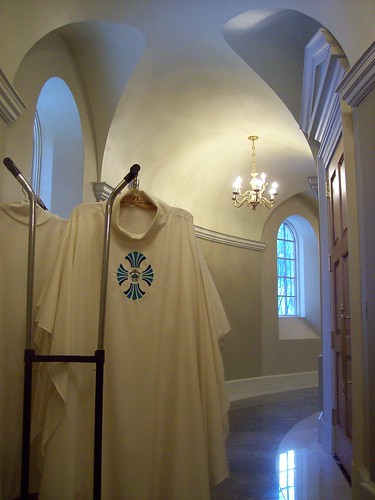
"Clad in his sacerdotal vestments, [the priest] sinks what is individual in himself altogether, and is but the representative of Him from whom he derives his commission. His words, his tones, his actions, his presence, lose their personality; one bishop, one priest, is like another; they all chant the same notes, and observe the same genuflections, as they give one peace and one blessing. . . The Mass must not be said without a Missal under the priest's eye. . . But, when it is over, and the celebrant has resigned the vestments proper to it, then he resumes himself, and comes to us in the gifts and associations which attach to his person. . . " John Henry Newman
If on arrival to a new parish, I have made changes, and I have made many, I have taught first and changed later, lest people get the idea that the chancel is the domain of the Pastor's personal preference. Such is a dangerous and terrible thing for it places the personality and preferences of the Pastor center stage at a very time when that personality and preference must recede so that Christ may be heard and seen through the words and actions of the Pastor. Such is, after all, the purpose of the Office of the Ministry as Lutherans confess in the Concordia. The Office is inseparably tied to the means of grace.
There is great benefit to Pastors being much the same in the chancel. Whether in manner, words, or actions, a high degree of uniformity in Pastors presiding and even preaching lends the people to the conclusion it is not about them as people but about the Word they speak and the Sacraments they administer. I am not speaking here of a mechanical uniformity, the kind of German precision which erases the face of the Pastor completely, but rather a careful attention to the Word and Sacraments of Christ as pre-eminent in all that the Pastor says and does.
I do not see a great benefit to Pastor's winging it at the altar or pulpit -- their ministry and the consequences are too great to be cavalier with the mysteries of God. Certainly it does no one good to read slavishly from missal, lectionary, or sermon text as if these words were unfamiliar and strange to him. Nevertheless, by his attention to the missal or lectionary book and to the sermon as proclamation of Christ, it becomes clear to the folks in the pew that the words bear not the authority of one man but of the Office for which Christ has set him apart and carry the authority of Christ to do what the Word and Sacraments promise.
One of the great and troubling conclusions from those who worship without the Divine Service, in what has become called "contemporary," is that the gifts and abilities as well as personality and preference of the Pastor are central to all that goes on (as are the gifts and performance of the musicians and others in these services). I fear that one of the unforeseen consequences of making the Pastor and musicians the "star performers" of the service is that the authority of their words and the confidence of the people in their actions moves from confidence in Christ's Word and in the promise inherent to the Sacraments to the ability, sincerity, accomplishment of the "star performers" -- much in the same way those who put on a good show are often held in higher regard than those who may have a better voice or ability but do not possess the "stage presence" to give their gift a platform.
When the Mass is ended and the people go in peace to serve the Lord in their baptismal vocations lived out in the world, the Pastor is also free then to resume his person and become himself. For some it is undoubtedly a relief to take off the vestments and leave behind the role and calling and for others it is with great regret and sadness that they resume their person. For me it is the latter. The highest and holiest of moments is when I as Larry Peters disappear into the work of Christ He is doing among His people through my voice and hands. Sometimes it is a great melancholy moment for me to walk back into the empty nave, make my way to the Vestry, and become "me" again. It is easier for me to know who I am and what I am to do when I act in the person of Christ and it presents me with a whole other challenge when it left for me to simply be Larry. I am not sure if this is a good thing or not, but I know that God does not want those who serve Him in the Office of Pastor to confuse their personal identity with their role and purpose as instruments of the means of grace by which He is present among and continues to bestow the gifts of grace and mercy to His people. 
|
